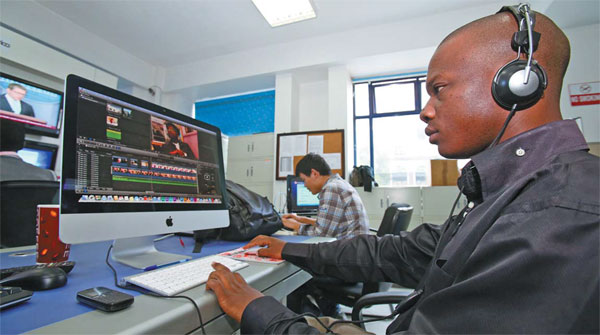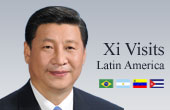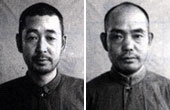Putting on a star performance
By Wang Chao (China Daily Africa) Updated: 2014-07-18 09:44
|
Chinese and local employees of StarTimes at a studio in Nairobi. Meng Chenguang / Xinhua |
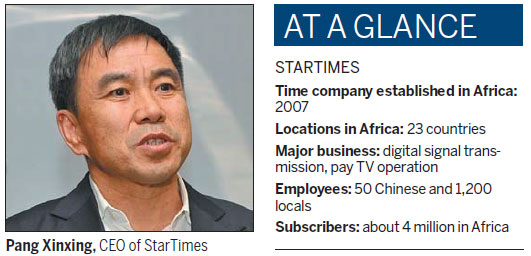
African subscribers warm to the digital TV services being offered by a Chinese operator
StarTimes, the pay TV operator, recently tempted subscribers in Nigeria with a very enticing offer.
Every month, new buyers of its set-up decoder were instantly entered in a drawing to win a new Toyota Yaris car. Winners were also given a one-month free subscription just to sweeten the deal.
The promo was the latest in a series from the expansive Chinese company, which now claims to have over 2.1 million subscribers across Africa, making it one of the fastest-growing and most influential digital TV operators in the region.
Last month, it cut the price of its pay-TV digital decoders in Kenya, for instance, from $34 to $22.8, and its free-to-air box from $57 to $51, to increase its market share.
The African pay-TV market is, however, still proving a brutal battle ground for StarTimes.
Not only are foreign companies now keenly focused on the region, as incomes rocket and living standards rise to match, but it still faces stiff competition from local operator DStv (Digital Satellite Television), which is owned by Naspers, the media conglomerate and Africa's largest listed company.
StarTimes, which has found its name listed five times in the Forbes list of enterprises of greatest potential, first entered Africa in 2002, and has now registered local companies in 16 countries, including Kenya, Tanzania, Uganda and Nigeria, and started operations in nine.
Over the past three years it has invested $150 million promoting its services in Nigeria alone, for instance, developing a 1.8 million customer base in the country, making it the biggest digital TV operator there.
In 2012, Nigeria's second-largest satellite broadcasting operator ODM was near bankruptcy and StarTimes acquired it after 18 months of negotiation.
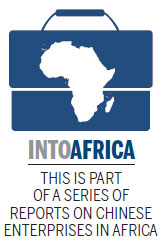
"South Africa is the political, economic and cultural center of Africa, and its media has a big impact on Africa," says Guo Ziqi, vice-president of StarTimes.
"Now that we have a live broadcasting platform in sub-Saharan areas, it means a lot to our market status in the continent."
StarTimes has digital TV operations in 13 countries with more than 4 million subscribers. Its 200 branch offices spread across Africa work with more than 5,000 distributors.
Its 320 channels include 38 in Chinese, one of which is the well-known Chinese soap opera A Beautiful Daughter-in-Law Era, which has been winning new fans in Tanzania.
The company is building an African headquarters and dubbing center in Nairobi, which when completed next year, will be the launchpad for a whole industry chain including program selection, translation, broadcasting and copyright trading.
Guo adds that its goal is to allow every African family to afford quality digital TV.
"For only $3 to $5 month they can watch up to 30 channels," he says.
Before heading to Africa, StarTimes was considered a small-time enterprise based in Beijing. When its CEO Pang Xinxing first visited the continent, he was staggered by the scale of the potential, he says.
At that time, just one company was operating a digital TV business, and on average customers needed to pay $70 a month for the service.
"Back then, $70 was a big amount, even without considering that most Africans didn't even have a TV to watch in the first place," Pang recalls.
"But we were confident of growth as several African nations were planning to shift from analog to digital TV signals. Now we plan to roll out our digital TV programs to 30 African nations over the next five years," he says.
Apart from providing digital TV services, StarTimes has also established 17 new channels including those showing Western movies, African programs, South African soap operas and Chinese programs, which produces more than 10,000 hours of programming a year.
The company has also translated 40 TV programs, movies and documentaries, into English, French, Hausa and Swahili.
"To accelerate our development, we have cooperated with local partners," Guo adds, "and now have signed agreements with numerous TV stations - including the Nigerian Television Authority, which is the national television network and also Africa's largest television network - providing content for them.
"By doing this we have outlets for our programs, and the local TV stations can also boost their advertisement revenues with the added content," he adds.
Michael Wu, the managing director of StarTimes in Nairobi, said in a previous interview with China Daily that part of the company's strategy is to tone down its Chinese origins.
"We don't want people to think we are a Chinese company. We just want locals to recognize us as a pay-TV company. For us it is about implementing a strategy of full localization," he said.
He claimed that South Africa's DStv, after more than a decade in the market, has only 1 million subscribers, while StarTimes already has more than double that number.
"We have local employees, our customers are local, and our brand is considered a local one, too," he added.
Antoine Onezime, CEO of Seychelles Broadcasting Corporation, says African customers have welcomed the arrival of Chinese companies.
"They have the capital, the technology and the talent, while we have content and stories; we can work together, either to advance our country's broadcasting industry or to shoot films or documentaries based on African materials."
Onezime adds that current StarTimes favorites are Africa Live, Talk Africa and Faces of Africa, as they send out a positive image of African people.
By February, StarTimes had 50 Chinese managers working in Africa, and more than 1,200 local staff.
Guo says it plans to train more local managers, so it can further integrate with the local culture.
However, Pang adds broadcasting digital content is more expensive in Africa than back home.
"The infrastructure can be poor and there is a lack of local TV talent, so it costs more to provide these services."
And money is not the only issue. Pang says some local pressure groups are also trying hard to influence the ongoing conversion process of analog-to-digital, so they can maintain their existing interest in some African countries.
"To make the transformation possible and let more African people enjoy quality digital TV, there has to be some competition in the market," he says.
"But it is vital to set the bar high for digital transmission companies to ensure a professional level of service."
He thinks, too, that African governments should allow foreign companies to have a bigger stake in the digital transmission industry.
"It requires big investment to build a successful digital transmission system, so African countries should allow foreign companies to take larger shares so they can bring in the capital they need."
Zambia's information and broadcasting minister Joseph Katema is in no doubt that Chinese companies such as StarTimes are benefiting his country's broadcasting industry.
"According to regulations set by the International Telecommunication Union, we are expected to stop using analog and transform to digital.
"With the help of our Chinese friends, we have more confidence in achieving this transformation."
Bob Wekesa contributed to the story.
wangchao@chinadaily.com.cn
(China Daily Africa Weekly 07/18/2014 page23)
